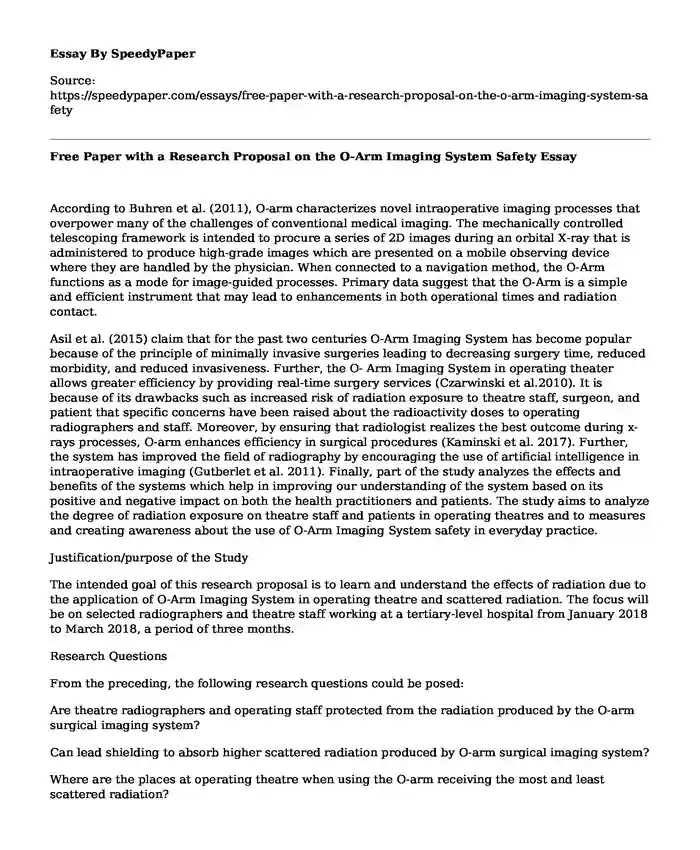According to Buhren et al. (2011), O-arm characterizes novel intraoperative imaging processes that overpower many of the challenges of conventional medical imaging. The mechanically controlled telescoping framework is intended to procure a series of 2D images during an orbital X-ray that is administered to produce high-grade images which are presented on a mobile observing device where they are handled by the physician. When connected to a navigation method, the O-Arm functions as a mode for image-guided processes. Primary data suggest that the O-Arm is a simple and efficient instrument that may lead to enhancements in both operational times and radiation contact.
Asil et al. (2015) claim that for the past two centuries O-Arm Imaging System has become popular because of the principle of minimally invasive surgeries leading to decreasing surgery time, reduced morbidity, and reduced invasiveness. Further, the O- Arm Imaging System in operating theater allows greater efficiency by providing real-time surgery services (Czarwinski et al.2010). It is because of its drawbacks such as increased risk of radiation exposure to theatre staff, surgeon, and patient that specific concerns have been raised about the radioactivity doses to operating radiographers and staff. Moreover, by ensuring that radiologist realizes the best outcome during x-rays processes, O-arm enhances efficiency in surgical procedures (Kaminski et al. 2017). Further, the system has improved the field of radiography by encouraging the use of artificial intelligence in intraoperative imaging (Gutberlet et al. 2011). Finally, part of the study analyzes the effects and benefits of the systems which help in improving our understanding of the system based on its positive and negative impact on both the health practitioners and patients. The study aims to analyze the degree of radiation exposure on theatre staff and patients in operating theatres and to measures and creating awareness about the use of O-Arm Imaging System safety in everyday practice.
Justification/purpose of the Study
The intended goal of this research proposal is to learn and understand the effects of radiation due to the application of O-Arm Imaging System in operating theatre and scattered radiation. The focus will be on selected radiographers and theatre staff working at a tertiary-level hospital from January 2018 to March 2018, a period of three months.
Research Questions
From the preceding, the following research questions could be posed:
Are theatre radiographers and operating staff protected from the radiation produced by the O-arm surgical imaging system?
Can lead shielding to absorb higher scattered radiation produced by O-arm surgical imaging system?
Where are the places at operating theatre when using the O-arm receiving the most and least scattered radiation?
Should there be extra radiation protection provided for radiographers when they have to use the O-arm such as spectacles?
Is there a particular point that the radiographer could stand when using the O-arm for imaging?
What type of radiations do O-arm surgical imaging systems emit?
Ethical Consideration/Analysis
The research proposal concerns were analyzed and ethically reviewed. The ethical challenges include
Does the proposed study have potential risks to patients and theatre staff?
Does the proposed study involve persons not able to give consent?
Is the proposed research benefit to health practitioners and theatre staffs?
Does the proposed study observe and respect confidentiality?
Does the proposed study involve human data collection?
Does the proposed study involve processing of personal data such as age, sex, and ethnicity?
Research Plan
The proposed study will follow a quantitative research methodology, comprising the use of existing literature as the primary method. It includes a preliminary descriptive examination of the different author's works about the perceptions and experiences of theater staff, radiographers, and patients in an operating room. The study will be limited to no more than ten articles from Ara databases, Google Scholar as well as ScienceDirect based on the effects of radiation originating from operation room on theater staff, patients or radiographers at a tertiary-level hospital because of irradiance of the O-arm imaging system. Due to time constraints involved in qualitative methodology and successive data analysis, the study will take a form of literature review.
References
Le Heron, J., Padovani, R., Smith, I., & Czarwinski, R. (2010). Radiation protection of medical staff. European journal of radiology, 76(1), 20-23. Retrieved from: http://www.ejradiology.com/article/S0720-048X(10)00309-8/pdf
Silbermann, J., Riese, F., Allam, Y., Reichert, T., Koeppert, H., & Gutberlet, M. (2011). Computer tomography assessment of pedicle screw placement in lumbar and sacral spine: comparison between free-hand and O-arm based navigation techniques. European Spine Journal, 20(6), 875-881.
Gonschorek, O., Hauck, S., Spiegl, U., Weiss, T., Patzold, R., & Buhren, V. (2011). O-arm-based spinal navigation and intraoperative 3D-imaging: first experiences. European Journal of Trauma and Emergency Surgery, 37(2), 99-108.
Cecen, G. S., Gulabi, D., Pehlivanoglu, G., Bulut, G., Bekler, H., & Asil, K. (2015). Radiation in the orthopedic operating theatre. Acta Orthop Traumatol Turc, 49(3), 297-301.
Pireau, N., Cordemans, V., Banse, X., Irda, N., Lichtherte, S., & Kaminski, L. (2017). Radiation dose reduction in thoracic and lumbar spine instrumentation using navigation based on an intraoperative cone beam CT imaging system: a prospective randomized clinical trial. European Spine Journal, 26(11), 2818-2827.
Cite this page
Free Paper with a Research Proposal on the O-Arm Imaging System Safety. (2022, Mar 28). Retrieved from https://speedypaper.com/essays/free-paper-with-a-research-proposal-on-the-o-arm-imaging-system-safety
Request Removal
If you are the original author of this essay and no longer wish to have it published on the SpeedyPaper website, please click below to request its removal:
- Free Essay Sample on Automotive Advancements in Technology
- Essay Example: A&P by John Updike
- Free Essay: Rock and/or Folk Music and War, Politics or Workers' Rights
- Nursing Essay Sample: Group Closing
- Essay Example: Overall Picture of My Values and Ethics
- Free Essay: Colleges in America Should Use a Pass/Fail Scale
- Free Essay Sample - the Economic Impacts of Natural Disasters
Popular categories





